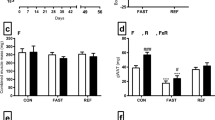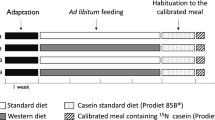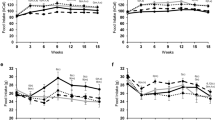Abstract
Optimization of food consumption is one the most critical issues of human wellbeing because both overeating and malnutrition can have adverse health effects. These food issues are especially important for children because wrong feeding at this stage of life has long-term consequences for adults and even their progeny. The present study compares the capability of skeletal hind limb muscle of one month old mice to catabolize glucose via glycolytic and pentose phosphate pathways under conditions of eating to satiation (ad libitum, AL feeding) versus limited access to food (dietary restriction in the form of every-other-day fasting, EODF). The steady-state concentrations of glycolytic substrates (glucose and glycogen) and intermediates (pyruvate and lactate) as well as triacylglycerides were generally lower in the muscles of EODF mice than those in AL animals were. EODF males and females had 28–49% lower glucose, 20% lower triacylglycerides and males had 26% lower glycogen levels than their AL counterparts did. The activities of glycolytic enzymes, namely hexokinase, pyruvate kinase, and lactate dehydrogenase were also lower in muscle of EODF than AL mouse groups, whereas the activity of glycogen phosphorylase was higher in EODF males and the activities of phosphofructokinase and glucose-6-phosphate dehydrogenase did not differ between two animal groups. Collectively our data show that muscles of EODF young mice possess a lower capacity to carry out glycolysis than those from AL fed counterparts. These data agree with findings of higher physical activity of EODF animals which forms an interesting basis for future studies.



Similar content being viewed by others
Availability of data and material (data transparency)
Data can be available for the request.
Code availability (software application or custom code)
Not applicable.
Abbreviations
- AL:
-
ad libitum
- EODF:
-
every-other-day fasting
- G6PDH:
-
glucose-6-phosphate dehydrogenase
- GP:
-
glycogen phosphorylase
- HK:
-
hexokinase
- LDH:
-
lactate dehydrogenase
- PFK:
-
phosphofructokinase
- PK:
-
pyruvate kinase
- TAG:
-
triacylglycerides
References
Anton SD, Moehl K, Donahoo WT, Marosi K, Lee SA, Mainous AG, Leeuwenburgh C, Mattson MP (2018) Flipping the metabolic switch: understanding and applying the health benefits of fasting. Obesity 26(2):254–268. https://doi.org/10.1002/oby.22065
Betz MJ, Enerbäck S (2018) Targeting thermogenesis in brown fat and muscle to treat obesity and metabolic disease. Nat Rev Endocrinol 14(2):77–87. https://doi.org/10.1038/nrendo.2017.132
Chen CN, Lin SY, Liao YH, Li ZJ, Wong AM (2015) Late-onset caloric restriction alters skeletal muscle metabolism by modulating pyruvate metabolism. Am J Physiol Endocrinol Metab 308(11):E942–E949. https://doi.org/10.1152/ajpendo.00508.2014
Childers CL, Storey KB (2016) Post-translational regulation of hexokinase function and protein stability in the aestivating frog Xenopus laevis. Protein J 35(1):61–71. https://doi.org/10.1007/s10930-016-9647-0
de Cabo R, Mattson MP (2019) Effects of intermittent fasting on health, aging, and disease. N Engl J Med 381(26):2541–2551. https://doi.org/10.1056/NEJMra1905136
Goldspink G, Ward PS (1979) Changes in rodent muscle fibre types during post-natal growth, undernutrition and exercise. J Physiol 296:453–469. https://doi.org/10.1113/jphysiol.1979.sp013016
Gonzalez-Bulnes A, Astiz S, Ovilo C, Garcia-Contreras C, Vazquez-Gomez M (2016) Nature and nurture in the early-life origins of metabolic syndrome. Curr Pharm Biotechnol 17(7):573–586. https://doi.org/10.2174/1389201017666160301103835
Hagopian K, Tomilov AA, Kim K, Cortopassi GA, Ramsey J (2015) Key glycolytic enzyme activities of skeletal muscle are decreased under fed and fasted states in mice with knocked down levels of shc proteins. PLoS One 10(4):e0124204. https://doi.org/10.1371/journal.pone.0124204
Hesketh KD, Campbell KJ (2010) Interventions to prevent obesity in 0-5 year olds: an updated systematic review of the literature. Obesity (Silver Spring) Suppl 1:S27–S35. https://doi.org/10.1038/oby.2009.429
Jensen J, Rustad PI, Kolnes AJ, Lai Y-C (2011) The role of skeletal muscle glycogen breakdown for regulation of insulin sensitivity by exercise. Front Physiol 2:112. https://doi.org/10.3389/fphys.2011.00112
Koubova J, Guarente L (2003) How does calorie restriction work? Genes Dev 17(3):313–321. https://doi.org/10.1101/gad.1052903
Kubben N, Misteli T (2017) Shared molecular and cellular mechanisms of premature ageing and ageing-associated diseases. Nat Rev Mol Cell Biol 18(10):595–609. https://doi.org/10.1038/nrm.2017.68
Kvedaras M, Minderis P, Krusnauskas R, Ratkevicius A (2020) Effects of ten-week 30% caloric restriction on metabolic health and skeletal muscles of adult and old C57BL/6J mice. Mech Ageing Dev 190:111320. https://doi.org/10.1016/j.mad.2020.111320
Li G, Xie C, Lu S, Nichols RG, Tian Y, Li L, Patel D, Ma Y, Brocker CN, Yan T, Krausz KW, Xiang R, Gavrilova O, Patterson AD, Gonzalez FJ (2017) Intermittent fasting promotes white adipose browning and decreases obesity by shaping the gut microbiota. Cell Metab 26(4):672–85.e4. https://doi.org/10.1016/j.cmet.2017.08.019
Litwin M, Feber J, Niemirska A, Michałkiewicz J (2016) Primary hypertension is a disease of premature vascular aging associated with neuro-immuno-metabolic abnormalities. Pediatr Nephrol 31(2):185–194. https://doi.org/10.1007/s00467-015-3065-y
Love AH (1986) Metabolic response to malnutrition: its relevance to enteral feeding. Gut 27(Suppl 1):9–13. https://doi.org/10.1136/gut.27.suppl_1.9
Mattson MP, Longo VD, Harvie M (2017) Impact of intermittent fasting on health and disease processes. Ageing Res Rev 39:46–58. https://doi.org/10.1016/j.arr.2016.10.005
Muronetz VI, Melnikova AK, Seferbekova ZN, Barinova KV, Schmalhausen EV (2017) Glycation, glycolysis, and neurodegenerative diseases: is there any connection? Biochemistry (Mosc) 82(8):874–886. https://doi.org/10.1134/S0006297917080028
Sadowska J, Dudzińska W, Skotnicka E, Sielatycka K, Daniel I (2019) The impact of a diet containing sucrose and systematically repeated starvation on the oxidative status of the uterus and ovary of rats. Nutrients 11(7):E1544. https://doi.org/10.3390/nu11071544
Sessa F, Messina G, Russo R, Salerno M, Castruccio Castracani C, Distefano A, Volti GL, Calogero AE, Cannarella R, Mongioi LM, Condorelli RA, Vignera SL (2020) Consequences on aging process and human wellness of generation of nitrogen and oxygen species during strenuous exercise. Aging Male 23(1):14–22. https://doi.org/10.1080/13685538.2018.1482866
Severin SE, Solovieva GA (1989) Practical work on biochemistry, 2nd edn. Moscow State University, Moscov, Russia
Shen Y, Xu X, Yue K, Xu G (2015) Effect of different exercise protocols on metabolic profiles and fatty acid metabolism in skeletal muscle in high-fat diet-fed rats. Obesity (Silver Spring) 23(5):1000–1006. https://doi.org/10.1002/oby.21056
Sorochynska OM, Bayliak MM, Gospodaryov DV, Vasylyk YV, Kuzniak OV, Pankiv TM, Garaschuk O, Storey KB, Lushchak VI (2019a) Every-other-day feeding decreases glycolytic and mitochondrial energy-producing potentials in the brain and liver of young mice. Front Physiol 10:1432. https://doi.org/10.3389/fphys.2019.01432
Sorochynska OM, Bayliak MM, Vasylyk YV, Kuzniak OV, Drohomyretska IZ, Klonovskyi AY, Storey JM, Storey KB, Lushchak VI (2019b) Intermittent fasting causes metabolic stress and leucopenia in young mice. Ukr. Biochem J 91:53–64. https://doi.org/10.15407/ubj91.01.053
Vasquez NA, Daher J (2019) Do nutrition and cash-based interventions and policies aimed at reducing stunting have an impact on economic development of low-and-middle-income countries? A systematic review. BMC Public Health 19(1):1419. https://doi.org/10.1186/s12889-019-7677-1
Vinnakota KC, Rusk J, Palmer L, Shankland E, Kushmerick MJ (2010) Common phenotype of resting mouse extensor digitorum longus and soleus muscles: equal ATPase and glycolytic flux during transient anoxia. J Physiol 588(Pt 11):1961–1983. https://doi.org/10.1113/jphysiol.2009.185934
WHO. Malnutrition is a world health crisis. Date of publication 26 September 2019. https://www.who.int/news/item/26-09-2019-malnutrition-is-a-world-health-crisis. Accessed 12 Jan 2021
Xie K, Neff F, Markert A, Rozman J, Aguilar-Pimentel JA, Amarie OV, Becker L, Brommage R, Garrett L, Henzel KS, Hölter SM, Janik D, Lehmann I, Moreth K, Pearson BL, Racz I, Rathkolb B, Ryan DP, Schröder S, Treise I, Bekeredjian R, Busch DH, Graw J, Ehninger G, Klingenspor M, Klopstock T, Ollert M, Sandholzer M, Schmidt-Weber C, Weiergräber M, Wolf E, Wurst W, Zimmer A, Gailus-Durner V, Fuchs H, Hrabě De Angelis M, Ehninger D (2017) Every-other-day feeding extends lifespan but fails to delay many symptoms of aging in mice. Nat Commun 8:155. https://doi.org/10.1038/s41467-017-00178-3
Acknowledgments
This work was supported by the grant from Ministry of Education and Science of Ukraine (#0118 U003477) to VIL and a Discovery grant from the Natural Sciences and Engineering Research Council of Canada (#6793) to KBS.
Funding
This work was mainly supported by a Ministry of Education and Science of Ukraine grant (#0118 U003477) to VIL and by a Discovery grant from the Natural Sciences and Engineering Research Council of Canada (#6793) to KBS.
Author information
Authors and Affiliations
Corresponding authors
Ethics declarations
Ethical statements
All experimental protocols were approved by the Animal Experimental Committee of Vasyl Stefanyk Precarpathian National University (Ukraine) and were conducted in accordance with the European Communities Council Directives of 24 November 1986 (86/609/ECC).
Conflict of interest
On behalf of all authors, the corresponding author states that there is no conflict of interest.
Consent to participate (include appropriate statements)
All the authors have contributed substantially to the work, participated in the writing of the manuscript, read and approved of the manuscript.
Consent for publication (include appropriate statements)
We confirm that this work is original and has not been published elsewhere, nor is it currently under consideration for publication elsewhere.
Additional information
Publisher’s note
Springer Nature remains neutral with regard to jurisdictional claims in published maps and institutional affiliations.
Rights and permissions
About this article
Cite this article
Sorochynska, O.M., Kuzniak, O.V., Bayliak, M.M. et al. Every-other-day fasting reduces glycolytic capability in the skeletal muscle of young mice. Biologia 76, 1627–1634 (2021). https://doi.org/10.1007/s11756-021-00717-w
Received:
Accepted:
Published:
Issue Date:
DOI: https://doi.org/10.1007/s11756-021-00717-w




